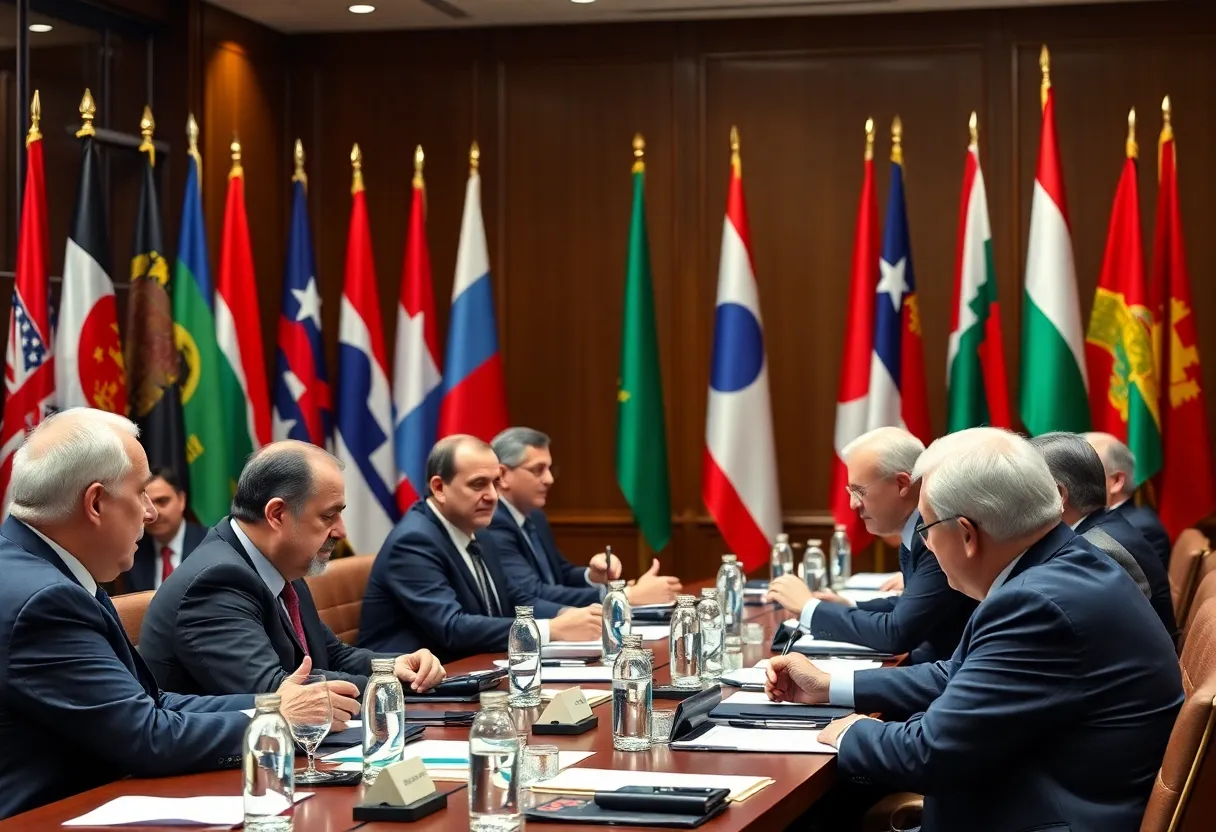News Summary
At the IMF spring meetings in Washington, UK Chancellor Rachel Reeves pushes for global free trade amid economic turbulence caused by ongoing tariffs from the US. With 60% of the UK’s GDP reliant on international trade, the importance of maintaining a free trade environment is emphasized. Discussions include reducing punitive tariffs on vital UK exports and addressing concerns over financial instability affecting global growth. The UK government remains cautious, prioritizing national interests while navigating strained trade relationships with the US and China.
UK Chancellor Pushes for Free Trade at IMF Spring Meetings
The world’s finance leaders are gathered in Washington for the IMF’s spring meetings, where the topic of discussion centers around President Trump’s major overhaul of the global economic climate. Among these leaders, UK Chancellor Rachel Reeves is setting the stage to advocate for global free trade amidst a backdrop of economic turbulence caused by the ongoing tariffs imposed by the US.
As Chancellor Reeves prepares for her discussions, it’s important to note that the UK’s economy heavily relies on international trade, with exports making up a staggering 60% of its GDP. This reliance amplifies the significance of maintaining and promoting a free trade environment, not only for the UK but for the global economy as a whole.
Conversations with US Treasury Secretary
One of Reeves’ key objectives will be to meet with US Treasury Secretary Scott Bessent. During this meeting, she hopes to address the need for reducing punitive tariffs on essential UK exports such as cars and steel. However, she is well aware of the challenges ahead, as securing exemptions from Trump’s current 10% global tariff seems quite unlikely. However, there’s still a hopeful outlook for discussions concerning a potential reduction on the higher 25% tariffs.
The UK government’s stance is clear; it plans to prioritize its national interests and is not looking to strike a trade agreement with the US at any cost. This cautious approach reflects the government’s understanding of the current volatile economic situation.
Financial Instability Looms Ahead
During the IMF spring meetings, the economic outlook is expected to be dim, with forecasts hinting at lower global growth rates due to increased risks of financial instability. Recent market volatility has particularly been notable in US Treasuries and the dollar, largely stemming from President Trump’s public criticisms aimed at Federal Reserve Chair Jerome Powell.
The concerns for the UK extend beyond tariffs alone. Projections indicate that a full-scale trade war could lead to a 1% reduction in the UK GDP by the year 2026-27. This reality underlines the urgency of the discussions taking place. Reeves is expected to engage in bilateral dialogues with other finance ministers, who share similar concerns regarding US trade policies.
Global Trade Under Threat
The trade strategies initiated by President Trump have drawn the attention of the World Trade Organization (WTO), which has expressed alarm over the potential fragmentation of global trade. If these tensions continue, a split could ultimately result in a 7% decrease in global GDP. Current tariffs imposed by the US are staggering, reaching as high as 145% on Chinese imports and 125% on American imports, escalating the tension in what many are now calling an ongoing trade war.
China, for its part, has shown a strong resolve to continue negotiations without any inclination to yield, signifying a readiness to retaliate if necessary. Reports indicate that while the US and China’s trade relationship accounts for merely 3% of global trade, its ripple effects on international trade dynamics are enormous.
Potential Shifts and Future Opportunities
Despite the foreboding forecasts, there remains a glimmer of hope, particularly for regions like Africa, which may find opportunities to diversify their exports amidst the changing global trade landscape. The WTO’s Director-General has pointed toward the essential need for nations to lean less on a single nation for critical goods. This reshaping of trade relationships emphasizes the importance of enhancing local manufacturing to create jobs while also fortifying global supply chains.
As the meetings unfold, it remains to be seen how such discussions will influence the future of international trade amid tightening economic conditions. Chancellor Reeves’ commitment to advocating for free trade looks to be a pivotal element in these tumultuous times, highlighting a collective hope for a more stable global economic environment.
Deeper Dive: News & Info About This Topic
- The Guardian: Rachel Reeves Advocates for Global Free Trade
- UPI: WTO Warns of Trade Fragmentation Due to Tariffs
- Bloomberg: Economic Chiefs Gather Amid Trade War
- The New York Times: The Trade War Game
- BBN Times: Trump’s Tariffs Ignite Global Trade War
- Wikipedia: Global Trade
- Google Search: global trade
- Google Scholar: global trade
- Encyclopedia Britannica: Global Trade
- Google News: global trade

Author: STAFF HERE NEWORLEANS WRITER
The NEW ORLEANS STAFF WRITER represents the experienced team at HERENewOrleans.com, your go-to source for actionable local news and information in New Orleans, Orleans Parish, and beyond. Specializing in "news you can use," we cover essential topics like product reviews for personal and business needs, local business directories, politics, real estate trends, neighborhood insights, and state news affecting the area—with deep expertise drawn from years of dedicated reporting and strong community input, including local press releases and business updates. We deliver top reporting on high-value events such as French Quarter Festival, New Orleans Jazz & Heritage Festival, and Essence Music Festival. Our coverage extends to key organizations like the New Orleans Chamber of Commerce and Greater New Orleans, Inc., plus leading businesses in energy, healthcare, and education that power the local economy such as Entergy, Ochsner Health, and Tulane University. As part of the broader HERE network, including HEREShreveport.com, we provide comprehensive, credible insights into Louisiana's dynamic landscape.

